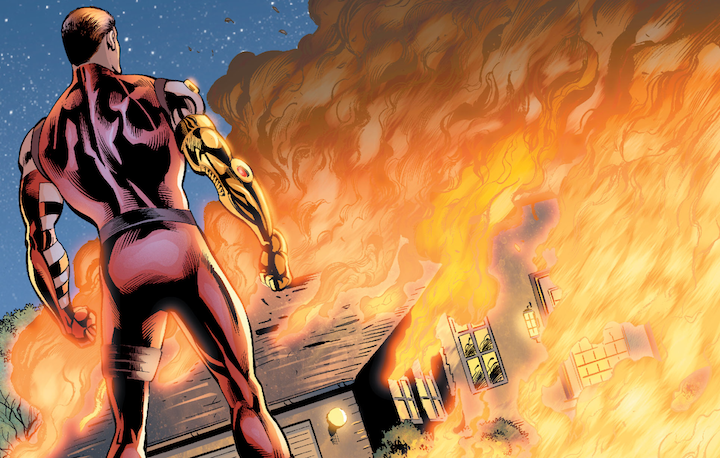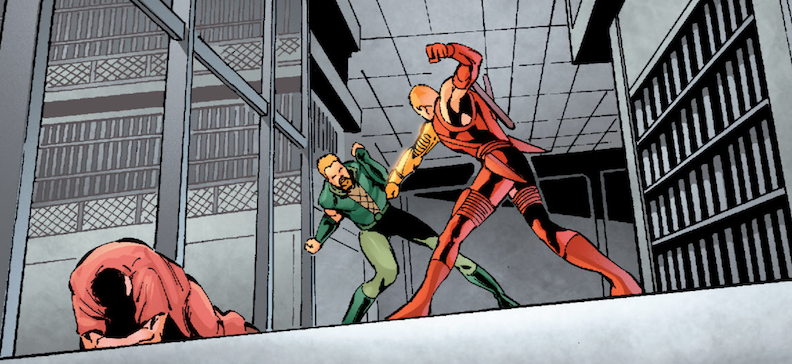Back in November, in a MAILBAG question, friend of the Geekery Kenny asked me if The Rise and Fall of Arsenal – the 4-issue miniseries from 2010 – was DC Comics’ “lowest point.” After months of forcing myself to read a story that went from out-and-out ridiculous to downright disturbing, we’ve finally reached the end! Or have we…
Justice League: The Rise of Arsenal 4
Written by JT Krul
Pencils by Geraldo Borges, Mike Mayhew and Kevin Sharpe
Inks by Marlo Alquiza and John Dell
Colors by Hi-Fi
When we left Roy Harper at the end of the LAST ISSUE, he was strapped to a bed in a drug rehab facility, telling his drug-induced imaginary friend that he really needed the help. There was a tiny bit of hope that, despite how terrible the previous issue was, maybe this series could end things on a high note. After all, it’s hard to go lower than the dead cat.
I should have known better.
If you are expecting a hero’s journey from Rise of Arsenal – where the protagonist perseveres and emerges victorious from the trials placed in front of him – you would be solidly disappointed. Roy Harper in no way emerges from this story victorious. There is no promised “Rise of Arsenal.” In fact, I would argue that all the series managed to do was plunge Harper into depths deeper than he’d ever previously experienced. Somehow, the higher-ups at DC Comics read this story and thought that the end result would be a win for the character and his fans.
As the issue starts, Harper is still strapped to a bed at the rehab facility and begins to hallucinate again, as his daughter Lian, killed at the hands of PROMETHEUS, appears and berates her detoxing dad. Dead Lian yells at Harper that he never loved her, only the adrenaline high from beating up baddies. If he really loved her, Dead Lian argues, Roy would be trying to avenge her, not stuck in rehab.
So Roy reopens the wound from when Prometheus amputated his right arm, bringing orderlies in to try and help him. So Roy knocks them unconscious and escapes. His plan? To break in to the prison where the Electrocutioner – the man who pushed the button that led to Lian’s death – is housed and kill him. Roy releases the prisoners on the Electrocutioner’s level, starting a riot as he hunts the low-level skel.

To combat the riot, the guards go to another inmate at the same prison – Roy’s mentor Oliver Queen, who just happens to be in his cell in his Green Arrow uniform. The guards release Ollie, who sets out to stop his former ward. Instead, the two just fight and Roy still manages to kill the Electrocutioner and escape capture. He then burns down his house as a way to exorcise the memory of Dead Lian and his recent past.
The issue ends with a note saying the story would continue in Titans: Villains For Hire, a one-shot that led into a story arc in the ongoing Titans book of the time. And before you ask, no, I’m not continuing on with this. My desire to keep reading this dreck eroded a few issues ago.
Now that I’ve finished the story, I guess it’s time to answer the question that kicked this journey off: Was Rise and Fall of Arsenal DC Comics’ lowest point? If it’s not, the miniseries, combined with Cry For Justice, is definitely in contention. There really aren’t any redeeming qualities to this story. Cry For Justice was rife with unnecessary shots of female heroes drawn in skimpy clothing, not to mention some seriously misogynist language. And both miniseries did nothing but tear down both Green Arrow and Arsenal, not to mention making Hal Jordan, Ray Palmer and others out to be militant jerks.
This whole saga, which took place in 2009-2010, feels more like an angsty late-1990s book setting up a new grim and gritty version of Roy Harper. It’s playing up Harper’s established history as a drug addict and troubled kid, while wiping away years of character growth and development for the sake of… I’m not even sure why Harper needed to be taken down, other than a “hey, wouldn’t it be cool if” scenario that didn’t actually have an end game.
It’s possible that getting killed off in HEROES IN CRISIS may have been a boon, saving Harper from getting kicked around by writers who want to needlessly make comics dark and moody.
I legitimately feel dumber for reading through this whole thing.
